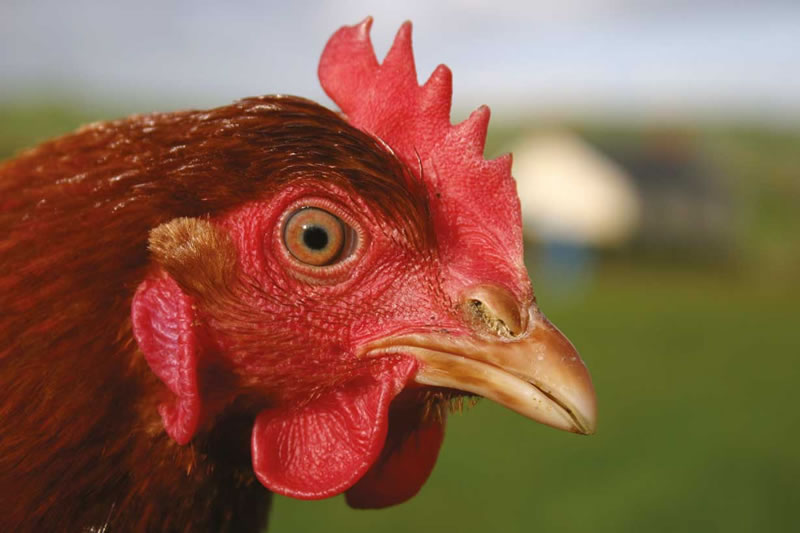
The animal welfare group Compassion in World Farming (CIWF) has told FarmingUK that a failure to address the issue of beak trimming could damage the image of British free range egg production.
Farming Minister George Eustice announced towards the end of November that the Government would not go ahead with a threatened ban on the use of beak trimming. His decision was based on the advice of the Beak Trimming Action Group (BTAG), which was set up to advise the Government on the best course of action.
BTAG, which comprised representatives from animal welfare groups – including CIWF - as well as poultry industry leaders, vets, scientists, retailers and Defra officials, produced a report suggesting that an immediate ban on beak trimming would be damaging to the welfare of hens. However, CIWF refused to put its name to the report, saying that it was very disappointed with the outcome of the review.
“It was just far too weak, “ said Peter Stevenson, chief policy adviser with CIWF. “It creates no real structure for taking this forward. We are very disappointed that 13 years after a ban was first enacted the industry is still not ready.” He said that Government had decided in 2002 to ban beak trimming. It was due to come into force in 2011 but had been put off, and it had now been put off again and there was no review planned to look at the issue again in the future.
“We are falling behind other countries where beak trimming has been banned and I don’t think this is doing the image of the free range sector any good. CIWF has been a big supporter of free range but we are very disappointed that, after 13 years, the industry is still not ready for the introduction of a ban on beak trimming.”
The planned introduction of a ban in 2011 was deferred in 2010 on the advice of the Farm Animal Welfare Council (FAWC), which was concerned about the implications for injurious pecking if the practice was outlawed. When it deferred the ban, the Government said it would review the decision in 2015 with a view to a ban being introduced in 2016.
Peter Stevenson said that decision created an expectation that a ban would be introduced in 2016 and the egg industry was warned that it should prepare for that to happen. But BTAG had concluded yet again that the industry was not prepared for managing birds without its use.
After the ban was deferred in 2010, trials were commissioned to find ways to manage commercial layers without the use of beak trimming. However, severe outbreaks of injurious pecking in some trial flocks raised concerns. A 16,000-bird free range trial flock in East Anglia had to undergo emergency beak trimming after injurious pecking resulted in a mortality rate of 20 per cent. On another free range trial unit in Yorkshire the mortality rate hit 15 per cent amongst birds whose beaks were left intact.
Peter Stevenson said he recognised that ending the use of beak trimming was a big challenge for the industry, but he said that CIWF would have preferred the Government to go ahead with legislation to ban beak trimming in 2016, with the Minister given discretion to decide on the date when the ban came into force.
At the very least, he said, CIWF wanted to see another date set for a review – probably in 2019. He said the egg industry had argued for another review to be delayed until 2025. “This would have been 23 years after the first legislation – nearly a quarter of a Century,” said Peter Stevenson. In the end, there was no legislation and no new review date set.
The Government’s decision was welcomed by egg industry leaders. Robert Gooch, director of policy with the British Free Range Egg Producers Association (BFREPA) said he was “delighted that the Government has accepted in full the recommendations of BTAG.” Mark Williams, chief executive of the British Egg Industry Council (BEIC), said, “We welcome the fact that the Minister has listened to BTAG’s concern that an immediate ban on beak trimming would be damaging to the welfare of hens.”
George Eustice said that BTAG had identified a number of improved management techniques that could reduce feather pecking and he said the Government expected to see these techniques introduced across the laying hen sector.
Both Robert Gooch and Mark Williams said that they were wholly committed to management techniques that could improve the problem of injurious pecking in laying hens. Mark Williams said, “UK egg producers have already made significant progress in reducing injurious feather pecking and we are committed to continuing this progress, to the point where beak trimming is not necessary.”
He said BEIC had already introduced management strategies to reduce feather pecking in the latest version of its Lion Code of Practice and had committed to review the code again to ensure that the latest recommendations from veterinary and animal welfare experts could be introduced.
Peter Stevenson said he accepted that some progress had been made, but he said CIWF would have preferred to have seen targets set by Government so that a reasonably swift conclusion could have been reached in ending the use of beak trimming.
